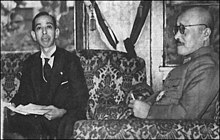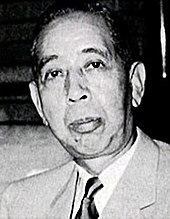Kishi Nobusuke
Kishi Nobusuke ( Japanese 岸 信 介 ; born November 13, 1896 in Yamaguchi , Yamaguchi Prefecture ; † August 7, 1987 in Shinjuku , Tokyo Prefecture ) was a Japanese politician ( IRAA → Gokokudōshikai → independent → Nihon Saiken Renmei → LP → independent → DPJ → LDP ) and from 1957 to 1960 the 37th Prime Minister of Japan and chairman of the Liberal Democratic Party. From 1941 to 1944 he was a minister in the Tōjō cabinet .
Life
family
Born as Satō Nobusuke ( 佐藤 信 介 ), he was adopted into the Kishi family by his paternal uncle. He married their daughter and cousin Yoshiko, with whom he had two children. He was the older brother of Prime Minister Satō Eisaku , father-in-law of LDP General Secretary Abe Shintarō and grandfather of Abe Shinzō , the current Japanese Prime Minister. Abe Shinzō's younger brother Kishi Nobuo (actually Abe) is also an LDP politician and has been a member of the House of Lords since 2004.
Career until the end of World War II

Kishi graduated from the Imperial University of Tokyo in 1920 with a law degree and then worked in the Ministry of Commerce and Industry ( Shōkōshō ). After the establishment of the puppet state of Manchukuo , he was sent there in 1936 to be nominally deputy head of the economic department in its government under a Chinese. In fact, he was the second most powerful civilian in the country behind the head of the general affairs department, Hoshino Naoki . He carried out economic reforms in Manchukuo along the lines of the Soviet five-year plan . He returned to Japan in 1940 to serve as Vice Minister for Trade and Industry.
During the war, Kishi was Minister for Trade and Industry in the Tōjō cabinet from 1941 to 1943 , then until 1944 Minister without Portfolio and at the same time Deputy Minister of Munitions. In April 1942 he was elected to the House of Representatives for the Taisei Yokusankai in the Yamaguchi 2 constituency. After the war he was imprisoned as a suspected class A war criminal in Sugamo Prison and released as part of the Christmas amnesty on December 24, 1948.
Post war career
After initially re-establishing himself as a businessman, Kishi returned to politics in the early 1950s after the exclusion of important wartime politicians and officials from public office was lifted. In 1953 he was re-elected to the House of Representatives for the Liberal Party , helped organize the Democratic Party of Japan and, as its General Secretary in 1955, was significantly involved in the “conservative union” of both parties to form the Liberal Democratic Party . In the Ishibashi Tanzan government , against whom he was only defeated in a ballot for party chairmanship in the runoff election in December 1956 , he served as foreign minister before replacing Ishibashi as prime minister and soon also as party chairman after his stroke in February 1957. He developed a lively diplomacy and worked towards an extension of the treaty with the USA from 1952 to a treaty on mutual cooperation and security . The protests against the treaty and the way in which it was ratified ultimately led to Kishi's resignation, who was succeeded by Ikeda Hayato .
For the 1979 election , Kishi did not run and withdrew from politics. He died on August 7, 1987 at the age of 90 in the University Hospital of Tōkyō Ika Daigaku ("Tokyo Medical University").
Honors
- 1960: Grand Cross of the Federal Republic of Germany
literature
- S. Noma (Ed.): Kishi Nobusuke . In: Japan. An Illustrated Encyclopedia. Kodansha, 1993. ISBN 4-06-205938-X , p. 791.
Web links
- Kishi Nobusuke in the Encyclopædia Britannica
Individual evidence
- ↑ 岸 信 介 . In: デ ジ タ ル 版 日本人 名 大 辞典 + plus . Retrieved December 16, 2011 (Japanese).
- ^ Encyclopedia of World Biography . 2nd Edition. tape 9 . Gale Research, ISBN 0-7876-2549-3 , pp. 1955 .
- ↑ Family tree of the Abe / Satō / Kishi / Yoshida family
- ^ Official seat of the Prime Minister , Historical Cabinets: (40.) Cabinet Tōjō
| personal data | |
|---|---|
| SURNAME | Kishi, Nobusuke |
| ALTERNATIVE NAMES | 岸 信 介 (Japanese); 佐藤 信 介 (Japanese, maiden name); Satō Nobusuke (maiden name) |
| BRIEF DESCRIPTION | 37th Prime Minister of Japan |
| DATE OF BIRTH | November 13, 1896 |
| PLACE OF BIRTH | Yamaguchi |
| DATE OF DEATH | August 7, 1987 |
| Place of death | Shinjuku |
